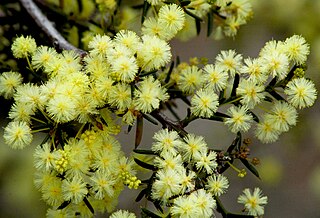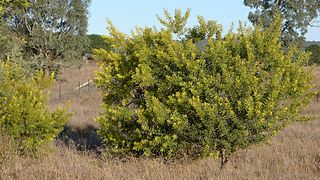
Acacia alpina is an evergreen shrub that is endemic to south eastern Australia.

Acacia podalyriifolia is a perennial tree which is fast-growing and widely cultivated. It is native to Australia but is also naturalised in Malaysia, Africa, India and South America. Its uses include environmental management and it is also used as an ornamental tree. It is very closely related to Acacia uncifera. It grows to about 5 m in height and about the same in total width. It blooms during winter.

Acacia genistifolia, commonly known as spreading wattle or early wattle is a species of Acacia in the family Fabaceae that is native to south eastern Australia.

Acacia myrtifolia, known colloquially as myrtle wattle, red stem wattle or red-stemmed wattle, is a species of Acacia native to coastal areas of southern and eastern Australia.

Acacia pravissima, commonly known as Ovens wattle, Oven wattle, wedge-leaved wattle and Tumut wattle, is a species of flowering plant in the legume family Fabaceae. It is an evergreen shrub native to Victoria, the South West Slopes and Southern Tablelands of New South Wales, Australia.

Acacia concurrens, commonly known as curracabah or black wattle, is a shrub native to Queensland in eastern Australia.

Acacia sclerophylla, commonly known as the hard-leaf wattle, is a shrub of the genus Acacia and the subgenus Plurinerves and is endemic to southern parts of Australia.

Acacia tayloriana is a shrub of the genus Acacia and the subgenus Pulchellae that is endemic to a small area of south western Australia

Acacia aureocrinita is a shrub belonging to the genus Acacia and the subgenus Phyllodineae that is native to parts of eastern Australia.

Acacia rubida, commonly known as red stem wattle, red stemmed wattle or red leaved wattle, is a shrub belonging to the genus Acacia and the subgenus Phyllodineae that is native to parts of eastern Australia.

Acacia cretacea, also known as chalky wattle, is a shrub belonging to the genus Acacia and the subgenus Phyllodineae that is endemic to South Australia.
Acacia infecunda, also known as famine wattle, is a shrub belonging to the genus Acacia and the subgenus Phyllodineae that is native to parts of south eastern Australia.

Acacia ruppii, commonly known as Rupp's wattle, is a shrub belonging to the genus Acacia and the subgenus Phyllodineae native to eastern Australia. It is listed as endangered in the Environment Protection and Biodiversity Conservation Act 1999.

Acacia sertiformis, commonly known as curly-leaved wattle, is a shrub belonging to the genus Acacia and the subgenus Phyllodineae native to north eastern Australia.

Acacia simmonsiana, commonly known as Simmons wattle or desert manna wattle, is a shrub belonging to the genus Acacia and the subgenus Phyllodineae native to south eastern Australia.

Acacia curranii, also known as curly-bark wattle, is a shrub belonging to the genus Acacia and the subgenus Juliflorae that is native to north eastern Australia. It is listed as vulnerable under the Environment Protection and Biodiversity Conservation Act 1999.

Acacia leptostachya, commonly known as Townsville wattle or slender wattle, is a shrub or small tree belonging to the genus Acacia and the subgenus Juliflorae that is native to north eastern Australia.
Acacia tabula, commonly known as Wombargo wattle, is a species of Acacia of subgenus Phyllodineae that is endemic to north eastern Victoria, Australia.

Acacia subporosa, also commonly known as river wattle, bower wattle, narrow-leaf bower wattle and sticky bower wattle, is a tree or shrub of the genus Acacia and the subgenus Plurinerves that is endemic to an area of south eastern Australia. It is considered to be rare in Victoria
Acacia tenuior, commonly known as Central Ranges wattle, is a shrub of the genus Acacia and the subgenus Plurinerves that is endemic to a small area in central Australia. It is considered to be rare in South Australia.
















